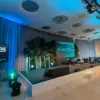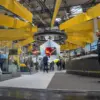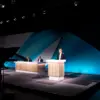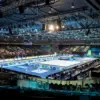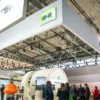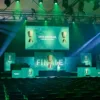… mitdenkende Häuser: Auf dem Branchentreff „Bosch ConnectedWorld 2020“, der Mitte Februar in Berlin stattfand, zeigte das Unternehmen in der Venue STATION-Berlin was im Bereich des Internets der Dinge (IoT) heute bereits möglich ist und welche Lösungen in Zukunft den Alltag unterwegs, zu Hause und bei der Arbeit erleichtern werden. Zum siebten Mal bereits trafen sich Führungskräfte, Entscheidungsträger, Innovatoren, Entwickler und IoT-Enthusiasten zu der zweitägigen Konferenz, die von Ausstellung, Hackathon und Networking-Party eingerahmt wurde. Mit 3.500 Teilnehmern, 170 Rednern auf fünf Bühnen und 80 Ausstellern ist die BCW die führende internationale Konferenz rund um IoT, vernetzte Produkte und Lösungen sowie digitale Transformation.
Seit Start der Konferenz-Serie sind wir als Dienstleistungsunternehmen fester Partner von Bosch und der Agentur Jazzberry für die Planung und Umsetzung aller technischen Gewerke, also Audio, Licht, Video, das Rigging und die Stromversorgung in den acht Hallen der „STATION-Berlin“, ebenso für die verschiedenen Redner-Bühnen sowie das große Plenum mit 2.200 Sitzplätzen. Wir stellten darüber hinaus die gesamte Messetechnik, beispielsweise Displays, für die Präsentation der namhaften Aussteller und sorgten im Lichtbereich für eine homogene Ausleuchtung der Hallen und effektvolle Showbeleuchtung. Für das Hackathon – die kollaborative Plattform für Soft- und Hardware-Entwickler zum diesjährigen Thema im Rahmen der sogenannten BCX – und die Konferenzteilnehmer standen darüber hinaus über 600 Arbeitsplätze mit entsprechender Stromversorgung bereit.
Für die Hauptbühne galt es, eine 90 m² große, hochauflösende LED-Wand mit Content zu bespielen; dieser wurde von uns aufgrund des Sonderformats von 25 mal 3,5 Meter speziell angepasst. Bosch entschied sich für eine unkomprimierte RAW-Einzelbildzuspielung für eine bestmögliche Bildqualität. In der denkmalgeschützten Venue musste die Realisierung in einem extrem engen Zeitrahmen erfolgen, was insbesondere für die logistischen Abläufe – es galt 24 Trailer mit Equipment für die acht Hallen zu managen – eine Herausforderung war. Neben den 6 FoH-Crews waren 160 Techniker in mehreren Schichten im Einsatz, die wesentlich dazu beitrugen, dass ein Event in dieser Größenordnung sicher und reibungslos umgesetzt werden konnte.
Key Facts
Kunde | |
Veranstaltungsdatum | 14. bis 22. Februar 2020 |
Veranstaltungsort | |
N&M Standorte | |
Unsere Leistungen | Audio, Video, Lighting, Conferencing, Rigging, Event-IT (Strom) |
Highlights |
|






